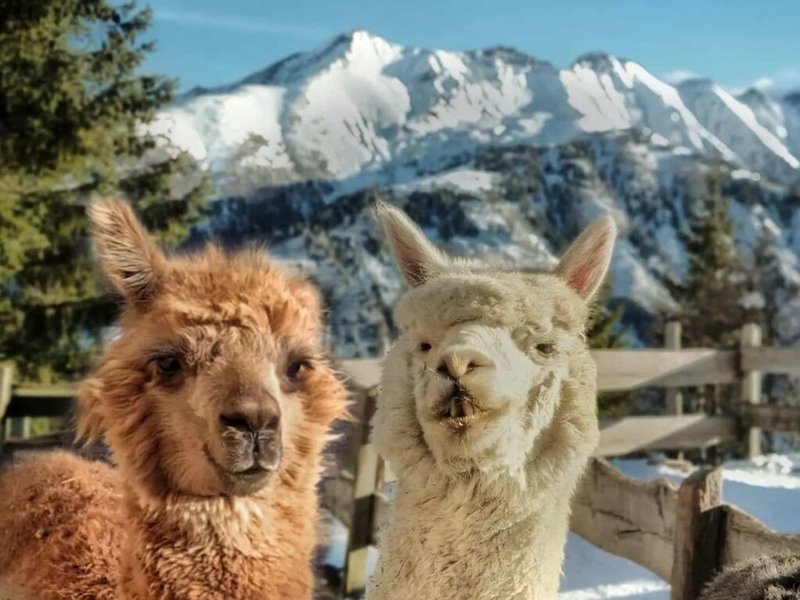
Here’s the thing: every animal has its own quirks and needs. Alpacas are social animals, and they typically enjoy the company of their kind. However, that doesn’t mean they can’t play nice with others. Let me explain how these interactions work and what you should consider if you’re thinking of adding alpacas to your mix of barnyard buddies.
The Nature of Alpacas
Alpacas are curious, gentle animals that thrive in groups. They have a unique herd mentality, often forming strong bonds with each other. It’s like how you might buddy up with someone who shares your interests. They communicate through a variety of sounds and body language, which adds a fun layer to their personalities.
What do alpacas need to be happy? They require a safe and spacious environment, proper nutrition, and protection from predators. Alpacas are also quite sensitive to temperature changes and stress, so a harmonious living situation is crucial. If they’re happy, they’ll frolic and interact joyfully with their companions.
You might be wondering how their personality differs from that of goats, sheep, or horses. While sheep and goats can be equally social, horses are a bit more independent by nature. That’s an important factor to consider when thinking about who to house together.
Can Alpacas Coexist with Goats?
Alpacas and goats can actually get along well, but there are some nuances to keep in mind. Both animals are herding creatures, which means they enjoy being in groups. They also share similar dietary needs, which helps when it comes to feeding time. However, goats can sometimes be a bit mischievous and may push the boundaries.
For example, goats are known for their climbing abilities and curiosity. They might nibble on your alpaca’s fleece or hog the feed. So, if you decide to keep both species together, it’s wise to supervise their interactions initially. Keep an eye out for any signs of stress—like a sneaky goat nibbling on an alpaca’s ear!
Strong fencing and separate feeding areas can help keep the peace. By doing this, you’re helping create a balanced environment where both animals feel secure and cared for.
Alpacas and Sheep: A Match Made in Heaven?
Alpacas and sheep can often live harmoniously together. Both prefer similar living conditions, including grassy pastures and plenty of space to roam. Since they have comparable temperaments, you’ll find that they can form a cozy little community.
Here’s something interesting: alpacas actually have a natural instinct to guard livestock, and this extends to sheep, too. They often act as protectors, helping to keep sheep safe from predators. If you have a flock of sheep, introducing an alpaca can provide both companionship for the sheep and security.
However, it’s important to ensure that the sheep don’t outweigh the alpacas in terms of size or aggression. Smaller sheep breeds usually pair better with alpacas. Just think of them as a friendly little neighborhood—everyone needs to know their role!
Living with Horses: Is It Possible?
Horses are a bit different from goats and sheep, and their relationship with alpacas can be more complex. Horses are generally larger and can be more dominant, which may intimidate the smaller alpacas. However, if introduced properly, they can coexist peacefully.
The key is to monitor their interactions. Like any new friendship, it can take time. You wouldn’t throw two strangers into a room and expect them to get along instantly, right? Start by introducing them slowly in a controlled environment. Observe their body language—are they relaxed? Are they curious, or showing signs of stress?
You might also want to consider providing separate feeding areas, as horses can have different dietary needs than alpacas. Plus, horses sometimes tend to be a bit pushy at feeding time. Keeping everyone well-fed and content helps to maintain peace within the barnyard.
Common Challenges and How to Overcome Them
While many animals can coexist, challenges can arise. It’s important to be aware of common issues that might surface when alpacas live with goats, sheep, or horses.
For starters, territorial behavior can sometimes occur. Animals can be protective over their space, particularly during feeding times. Make sure you have enough space where they can all feel comfortable.
Another challenge is stress, which can manifest in various ways. If you notice your alpacas are skittish or avoiding others, it might indicate they’re feeling overwhelmed. Giving them a quiet space to retreat to can help alleviate this.
Finally, don’t forget about health monitoring. Different species can carry different diseases, so it’s wise to keep up with vaccinations and regular vet visits. Regular check-ups will help safeguard against any health issues that could arise from close quarters.
So, can alpacas live with goats, sheep, or horses? Absolutely, but it does require some planning and understanding of their unique needs and behaviors. By introducing them thoughtfully, ensuring enough space and resources, and keeping an eye on their interactions, you can create a peaceful and thriving community.
Think of your barnyard like a cozy neighborhood where everyone has their own quirks, but they can all come together to enjoy life. In the end, the key is to be attentive and patient—like nurturing any good relationship. With care and consideration, your alpacas can live harmoniously with their barnyard buddies, creating a charming and lively atmosphere on your farm.

